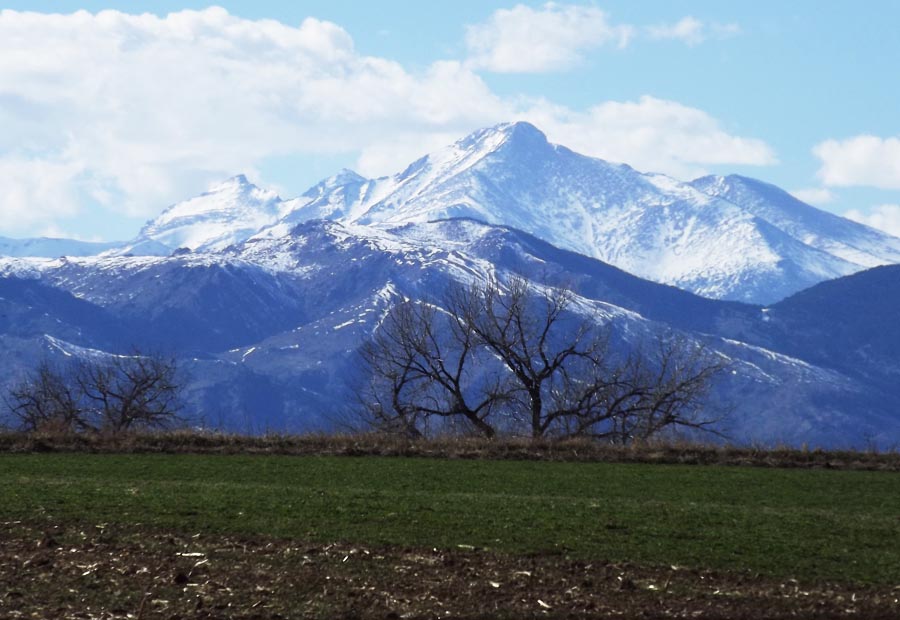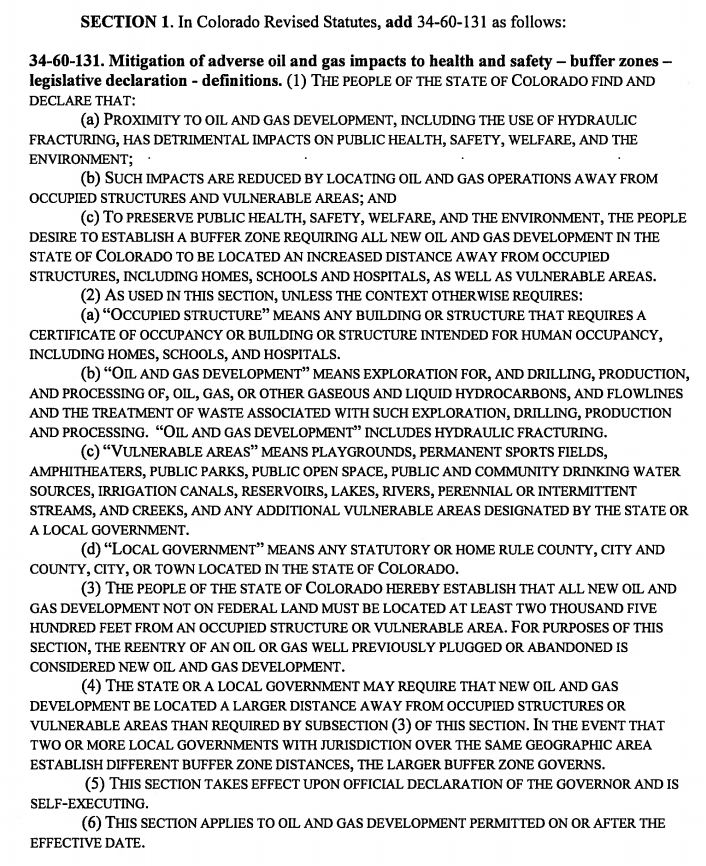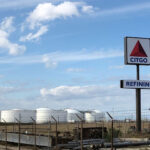
A Colorado TV station last week offered an attempt at a balanced story about Proposition 112—Oil & Gas setbacks. The ballot question comes up on the mail-in ballots going to voters beginning Oct. 15.
“Here’s how you’ll hear Proposition 112 described by its supporters,” Colorado Springs TV station 11 News reported last week.
“‘It’s a last-ditch effort for Coloradans to protect their communities and neighborhoods from an ever-encroaching industry that has run rough-shot over our communities’, stated Colorado Rising Volunteer Anne Lee Foster.
“This is how its opponents classify the proposition: ‘Prop 112 has nothing to do with safety, it’s essentially a ban on oil and gas in Colorado’, Urban Solution Group CEO Heidi Gill said.”
“Here’s what Proposition 112 would do: push new oil and gas production back from 500 feet for homes, 1,000 feet from schools, and hospitals to 2,500 feet, limiting how close those sites can be built.”
But the Channel 11 report omitted referencing the portion of the proposition that says the 2,500-foot setback applies to “vulnerable areas” which is later defined as all water sources, wet or dry, or any areas designated as vulnerable by the State or by a local government. This restriction would knock out most of the acreage from drilling and development and opens the door to any other area being defined as vulnerable.

What the opponents of 112 are saying
“’They claim this is more about killing oil and gas in the state by blocking any spot the industry would try to drill on, and less about safety.
“’There is no data at all from any public health agency that 2,500 feet has any kind of factual basis at all in terms of health and safety’,” said Vital for Colorado’s Simon Lomax. “ ‘It’s a political number, not a health and safety number. “
What the proponents of 112 are saying
“Supporters say there is no language whatsoever about a ban, and this is just about protecting citizens from an encroaching industry that poisons people close by. They also have deep concerns about any slip-ups the industry could make, like the fatal Firestone natural gas explosion north of Denver in 2017 that killed two people.
“’This is just a common-sense protection to keep this industrial toxic activity away from our neighborhoods and protect our community’,” Foster said.
“’I think more importantly that the endorsements of the over 172,000 people who are not influenced by corporate interests and signed the petition wanting to be able to vote on safer setbacks are much more important to us,” Foster said.
Opponents’ view
Critics of the proposition say this could kill 43,000 jobs in the first year and up to almost 150,000 by 2030, most of which will not be in the energy sector. This data comes from a bipartisan pro-business research council research council.
“Prop 112 is a scary proposition to us,” Springs Fabrication CEO Tom Neppl admits. “The thought of restricting drilling to the point where it leaves the state really makes us concerned. We would most likely need to lay off a significant number of people.”
“His 120 Colorado Springs employees construct multiple projects for oil and gas companies. He said he’s got a backlog of projects right now, but if Prop 112 goes through, that work will dry up, leaving him with tough choices with his workforce.
“’You look at that industry, it touches every other industry out there’,” Neppl said.
Proponents’ view
“Meanwhile, the supporting side says the industry is touching a lot more than business, it’s touching neighborhoods in a negative way.
“’It’s about protecting Colorado’s long-term quality of life. The oil and gas industry is increasingly becoming large-scale industrial sites that are being literally sited in people’s backyard’, Foster said.”
Conflicting health studies
“Colorado Rising, the organization that brought the proposition up to voters says a Colorado School of Public Health study shows the risk of cancer is raised greatly, along with low birth weights and repertory disorders.
“A Colorado Department of Public Health report shows the risk of health defects for people living 500 feet or farther away from oil and gas production is actually low but needs more testing.
“Ballots will go out to Colorado voters on Oct. 15th,” the Channel 11 report ended.
In a survey of voters by Oil & Gas 360, 56% said they would vote “yes” on Proposition 112’s mandatory 2,500-foot setback for new oil and gas development
Oil & Gas 360® conducted a Survey Monkey-based poll of Colorado voters between Sept. 26 and Oct. 1. The sample of people polled came from a Facebook group. Responses from anyone who said they were not registered to vote in Colorado were excluded from this report.
Survey QUESTIONS and RESPONSES:
- If the Colorado election were held today, how would you vote on the following question?
“To preserve public health, safety, welfare, and the environment, shall a buffer zone be established requiring all new oil and gas development in the state of Colorado to be located 2,500 feet away from occupied structures, including homes, schools and hospitals, and other vulnerable areas including drinking water sources, streams and creeks, and any additional vulnerable areas designated by the state or a local government?”
YES: 56%
NO: 44%
2. Which answer best describes how you feel?
Colorado’s oil and gas resources should be left in the ground because they are fossil fuels. YES 37%
Colorado’s oil and gas resources should be further drilled and developed. YES 63%
3. What comes to mind when you hear the words ‘hydraulic fracturing’ or ‘fracking’?
- A method of extracting oil and gas out of the ground
- Money
- Searching for oil by penetrating the earth
- Water pollution
- Releasing hydrocarbons from solid rock
- Money
- Frack Boulder
- Money
- A controversial form of gas and oil extraction due some of the side effects of the process when not managed wisely. However it is a vital part of our current energy industry and important even as we change our energy system to “greener” options as many products still require petroleum that we use every day such as plastics and other composite materials
- Groundwater contamination
- No idea
- Necessary
- Energy
- How safe is it, really?
- Increasing porosity and conductivity of geological features to decrease return times and increase profit
- Contaminated ground water
Demographics of the sample: 75% of the respondents were 18-34 years old; the remainder were 45+ years old. Counties of voter registration as reported by respondents were Adams, Arapahoe, Denver, Douglas, Larimer and Mesa counties.
NOTE: The sample of respondents was not intentionally skewed toward oil and gas industry workers or any other group, but some answers to the frac question indicated a fairly high degree of knowledge of the process—25% of the respondents gave a somewhat accurate, or detailed description of the process. 31% of respondents reported negative connotations associated with fracing.
Advertising budgets have been unleashed on Denver area radio and television
The Colorado Independent summed up contributions as follows:
“… Far and away the issue pulling in the most money is a ballot measure that would increase nearly fivefold the distance that oil and gas operations can drill from homes and other vulnerable areas like streams: Proposition 112, also known as Initiative 97.
“As of Sept. 4, oil and gas companies have kicked in $21 million to an issue committee fighting the initiative so far this year, according to campaign finance reports filed with the Colorado Secretary of State. There are practically no limits on how much money an issue committee can accept or spend. The committee can then use this money to collect signatures, buy media ads and air its views on the TV and radio.”








